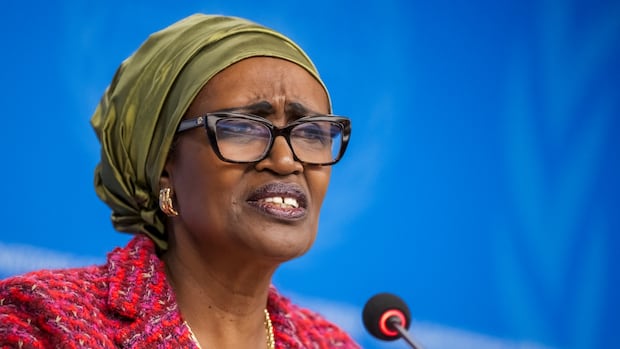
Trump stopped the global fight against HIV/AIDS in his track. Canada can help fix it
Winnie Bureau, who calls her incredible cruelty, is trying to catch Asha in front of her.
She is the Director of Unaids, the United Nations agency, UNAIDS, recently, on track to meet her goal of ending AIDS as a public health threat by 2030.
But now, as the second administration of President Donald Trump, fast and Dramatically takes back to US foreign aid contributionUNAIDS is predicting in a new report instead that within the next four years there will be six million new HIV infections and four million additional deaths.
“It’s just so cruel,” Burneema said As it happens Host nil kӧksal. “It was not necessary to withdraw money for sudden life saving services.”
But these serious predictions, she says, are not set in stone. The fight against HIV/AIDS may return to the track if the international community, including Canada, moves.
Doctors say Canada should lead
in February, America suddenly separated relations with Unaids Preventing two-thirds of all international financing effectively for prevention of HIV in low and moderate income countries.
Latest Report of Unaids – AIDS, crisis and change power -How many of the countries affected by those cuts responded by increasing their own domestic HIV/AIDS treatment budget and twisting global donation work in their local health care systems.
“They are looking for innovative ways to plug all the holes, but the hole is big,” Bayenaima said. “Let’s not make mistakes about it. We need all countries of the world to fight and end the disease.”
Public health experts of this country say that Canada needs a way.
Dr. Eric Arts London is a Canada Research Chair at a viral control at Western University at London, where he has also carried forward the school partnership with the United Clinical Research Center, a Uganda Research Institute, and the Health Clinic.
Through that work, he has seen the effect of American funding freeze for the first time: mass trimming, financial uncertainty, stopping patients and starting their treatment based on the craze of bureaucrats.
Nevertheless, he says that it is time to look inside, not outwards.
“There is always a lot of emphasis on blaming America,” art told the CBC. “I mean, yes, they are now the root of the problem. But we have a solution. And the solution is easy.”
Canada, they say, should be doubled Its amount for global fund – International organizations that distribute money around the world to deal with HIV, tuberculosis and malaria – and push other G7 countries to do so.
In 2022, Canada increased by 30 percent in global fund contribution, promising $ 1.21 billion for 2023 to 2025. But this is still a decline in the bucket. About $ 8 Blueon America pledged at the same timeAnd which is unlikely to be renewed.
Dr. Julio Montener, who is a physician-in-chief for BC Center for Excellence in HIV/AIDS, says he has been dumb and destroyed by the decision to cut funding for the US Administration’s US Agency for International Development (USAID). Montar says that this decision will cause a significant increase in HIV matters worldwide.
‘A work of criminal negligence’
Dr. Julio Montener, Executive Director of BC Center for Excellence in HIV/AIDS, agrees. He was one of the people who helped develop the multi-drug cocktails of antiretroviral, which has become the standard of gold for HIV treatment, and helped establish the norms used for UN for their 2030 targets.
For a long time, they say that the “Made in Canada” strategy was working worldwide. Few people were contracting HIV, and thanks to antiretroviral, people living with HIV were not transmitting it.
A large part of this, he says, was due to funding from the President’s Emergency Plan for AIDS Relief (Pepfar), which was established in 2003 by former President George W. Bush as it is financed about 70 percent of the global AIDS response.
Pepfar is Also on US chopping block,
“On a small information and without a plan, walking away from that commitment is a task of criminal negligence,” said Montanar.
“I demand that my country actually raises the flag and display that we can do it in Canada, and support the world. Because, in four years, Americans are going to wake up. And if we do not cover for absence, the world is much worse than today.”
Trump himself has called upon other countries to take dull from his cuts, which he described as “destructive”.
“The United States always receives request for money,” He said in May. “No one else helps.”
A global disease requires a global solution: United Nations Director
Kala says that it is not only a matter of helping people in other countries.
“If Canada or any other G7 country or G20 country thinks we can do this and it cannot reach our borders, then they are crazy,” he said. “This would be another global epidemic. If we cannot, we do not, provide treatment.”
Global Affairs was unable to respond to the recommendation request of the Canada Canada deadline.
Meanwhile, Bayanima, currently in South Africa, says that it has promoted its domestic budget for the prevention and treatment of HIV/AIDS in the face of US cuts, and is working to install an old drug distribution and distribution system.
Seeing that response, she says, gives her hope. But it is not enough.
“This is a global disease. It is not a country’s disease,” he said. “A global problem requires a global solution.”
